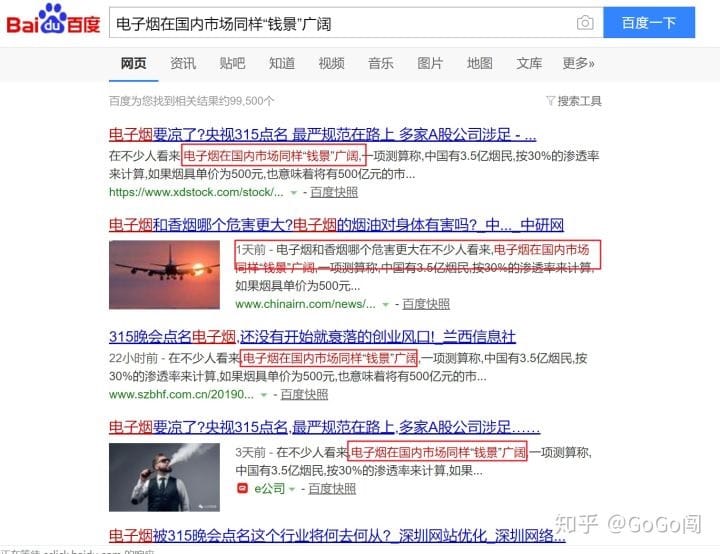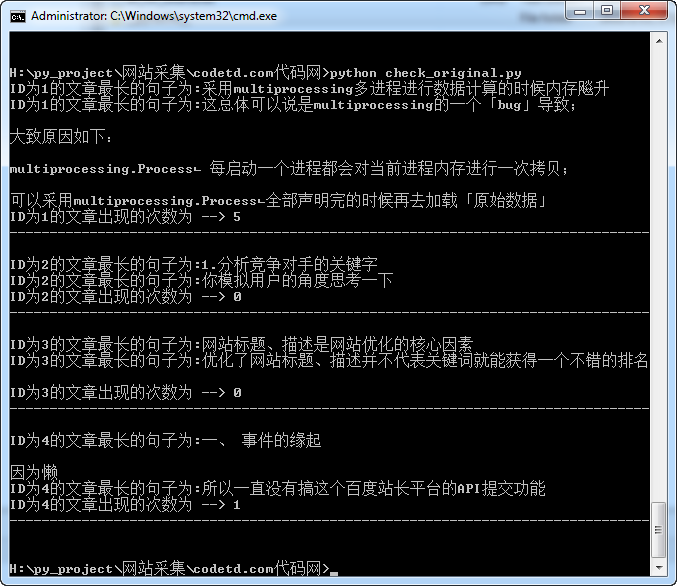一、原理
1.先把一篇文章,按逗号分隔成一个一个句子。(有点缺陷,比如如果句子中是冒号,分号,它认为是一句话。)
2.然后计算每个短语的字数,取字数最多的两句话。
3.拿上面两句话去百度搜索,并分别计算每句话在百度第一页搜索结果中的次数,然后加总。出现次数最少的文章,我们认为它的原创性要高一些。
因为若一个文章被其他网站大量转载,那么随便提取该文章中一个短语,都能在百度搜索出完全重复的内容:

二、成果展示

三、代码
#coding:utf-8
import requests,re,time,sys,json,datetime
import multiprocessing
import MySQLdb as mdb
def search(req,html):
text = re.search(req,html)
if text:
data = text.group(1)
else:
data = 'no'
return data
def date(timeStamp):
timeArray = time.localtime(timeStamp)
otherStyleTime = time.strftime("%Y-%m-%d %H:%M:%S", timeArray)
return otherStyleTime
def getHTml(url):
host = search('^([^/]*?)/',re.sub(r'(https|http)://','',url)) #后半部分是去除网址前缀,前半部分是得到www.baidu.com。
headers = {
"Accept":"text/html,application/xhtml+xml,application/xml;q=0.9,image/webp,*/*;q=0.8",
"Accept-Encoding":"gzip, deflate, sdch",
"Accept-Language":"zh-CN,zh;q=0.8,en;q=0.6",
"Cache-Control":"no-cache",
"Connection":"keep-alive",
#"Cookie":"",
"Host":host,
"Pragma":"no-cache",
"Upgrade-Insecure-Requests":"1",
"User-Agent":"Mozilla/5.0 (Macintosh; Intel Mac OS X 10_11_4) AppleWebKit/537.36 (KHTML, like Gecko) Chrome/52.0.2743.116 Safari/537.36",
}
# 代理服务器
proxyHost = "proxy.abuyun.com"
proxyPort = "9010"
# 代理隧道验证信息
proxyUser = "XXXX"
proxyPass = "XXXX"
proxyMeta = "http://%(user)s:%(pass)s@%(host)s:%(port)s" % {
"host" : proxyHost,
"port" : proxyPort,
"user" : proxyUser,
"pass" : proxyPass,
}
proxies = {
"http" : proxyMeta,
"https" : proxyMeta,
}
html = requests.get(url,headers=headers,timeout=10)
# html = requests.get(url,headers=headers,timeout=30,proxies=proxies)
code = html.encoding
return html.content
def getContent(word):
"""
比对进度搜索结果,返回word在搜索结果中出现的次数
"""
pcurl = 'http://www.baidu.com/s?q=&tn=json&ct=2097152&si=&ie=utf-8&cl=3&wd=%s&rn=10' % word
# print '@@@@@@@@@@@@@@@@@@@@@@@@@@@@@@@@@@@@ start crawl %s @@@@@@@@@@@@@@@@@@@@@@@@@@@@@@@@@@@@' % pcurl
html = getHTml(pcurl)
a = 0
html_dict = json.loads(html) #百度结果是json格式,所以可以loads
for tag in html_dict['feed']['entry']:
if tag.__contains__('title'):
title = tag['title']
url = tag['url']
rank = tag['pn'] #排名。
time = date(tag['time'])
abs = tag['abs'] #摘要
# print(abs)
if word in abs:
a += 1
return a
con = mdb.connect('127.0.0.1','root','','python_test',charset='utf8')
cur = con.cursor()
with con:
cur.execute("select aid,content from article_content limit 5")
numrows = int(cur.rowcount)
for i in range(numrows):
row = cur.fetchone()
aid = row[0]
content = row[1]
content_format = re.sub('<[^>]*?>','',content)
a = 0
for z in [ x for x in content_format.split(',') if len(x)>10 ][:2]: #将文章按','分为一个个句子,取最长的两个句子。
print("ID为{}的文章最长的句子为:{}".format(aid,z))
time.sleep(5)
a += getContent(z)
print ("ID为{}的文章出现的次数为 --> {}".format(aid,a))
print("-"*80)
# words = open(wordfile).readlines()
# pool = multiprocessing.Pool(processes=10)
# for word in words:
# word = word.strip()
# pool.apply_async(getContent, (word,client ))
# pool.close()
# pool.join()

